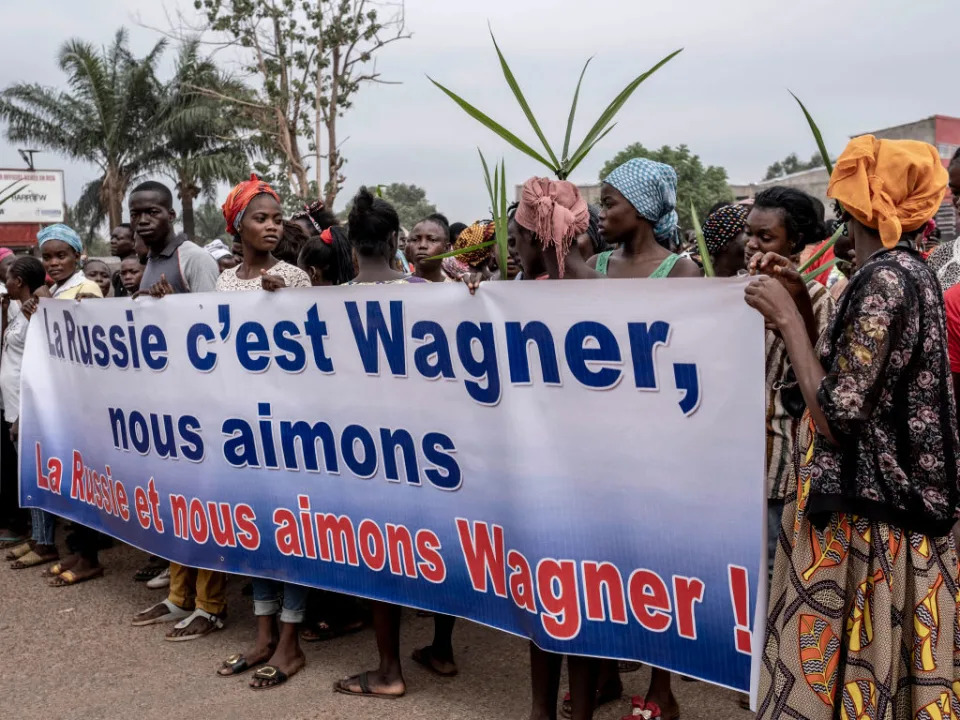BERLIN—As news spread across the Central African Republic (CAR) on Saturday that thousands of mercenaries from Russia’s Wagner Group had started to march to Moscow in a mutiny led by their boss Yevgeny Prigozhin, cabinet members in the restive African nation became very uncomfortable and started to phone each other with concern, according to a senior government official who spoke to The Daily Beast.
The CAR government has a very close relationship with the Wagner Group, which has built a spider's web of military and economic relationships over the past five years in a number of African countries, including Libya, Sudan and Mali.
In CAR alone, Russia has—over the last five years—sent weapons and hundreds of military advisers and Wagner mercenaries as an extension of the government’s security forces. The Wagner fighters have been intimidating locals and targeting citizens opposed to the private military company’s presence, while also exploiting the country’s mineral resources.
Why Did Putin Let Prigozhin Walk Away?
But Prigozhin’s decision to seemingly turn on his former ally, Russian president Vladimir Putin, set off panic among those who benefit from Wagner’s activities in Africa.
“Yes, there are Wagner mercenaries [in CAR] and everyone is worried that the face-off between Putin and Prigozhin would bring an end to their operations in our country,” said an adviser to CAR President Faustin-Archange Touadéra in a private conversation with The Daily Beast via telephone. “The Russians play a very important role in the security architecture of our country and if they are forced to pull out completely, things could become messy.”
The longer the mutiny lasted, the more worried CAR officials were, according to the government adviser. As reports emerged that Prigozhin and his troops had captured Rostov-on-Don—a southern Russian city that has served as a critical logistics hub supporting Putin's ongoing war in Ukraine—and were continuing to march towards Moscow, CAR government officials became scared that Russia could descend into a civil war, which could affect the support the African nation gets from the Kremlin through Wagner.

Demonstrators carry a banner in Bangui, on March 22, 2023 during a march in support of Russia and China's presence in the Central African Republic.
"Everyone feared that if war broke out in Russia, the Russians [in CAR] would not only be forced to return home, but our political, military and business relationship with Russia would be halted," he said. "The last thing the government [in CAR] wants to see at the moment is the exit of Russia from the country."
When news broke late Saturday that Belarusian President Alexander Lukashenko had reached a deal with Prigozhin to call off the coup and take refuge in Belarus, government officials in CAR were anxious to know what would become of Wagner's operations in the country, a senior military official told The Daily Beast in another private telephone conversation.
“Cabinet members were calling both [CAR] military officers and Russian military instructors [present in CAR] to find out if they had received any information about Russia's role in the country going forward,” said the official who works at the CAR army headquarters in the capital, Bangui. “But nobody, not even the Russian instructors here [in CAR], has got any information relating to that.”
Russian State TV Anchors Aghast that Putin Didn’t Kill Prigozhin
Wagner's influence in governance in CAR is huge. At some point, a former Russian military intelligence officer, Valery Zakharov, served as the national security adviser to the president, and a shell company known as Diamville not only forces CAR's poor miners and collectors to turn over their gems or sell them only to the Wagner-owned company, but also plays a key role in mining regulations in the country.
The coup attempt in Russia may have been aborted, albeit temporarily, but the brazen nature of the assault against the Russian state could have major repercussions for Wagner's operations in Africa. And, as the uncertainty continues, those who benefit from the group's presence in the continent remain anxious.
"Have you heard anything about where Yevgeny Prigozhin is?" the CAR government adviser, sounding apprehensive, called The Daily Beast Sunday morning to inquire. "We just don't know what's going on." By Philip Obaji Jr., Daily Beast/Yahoo News




